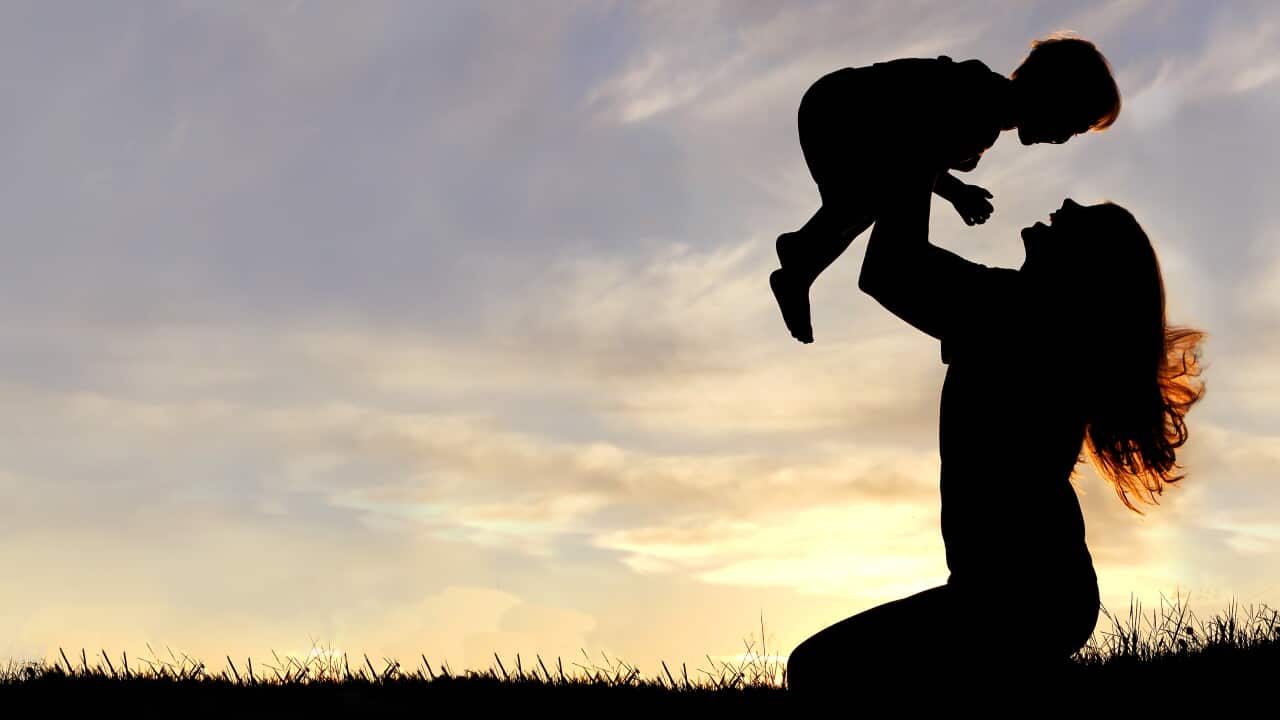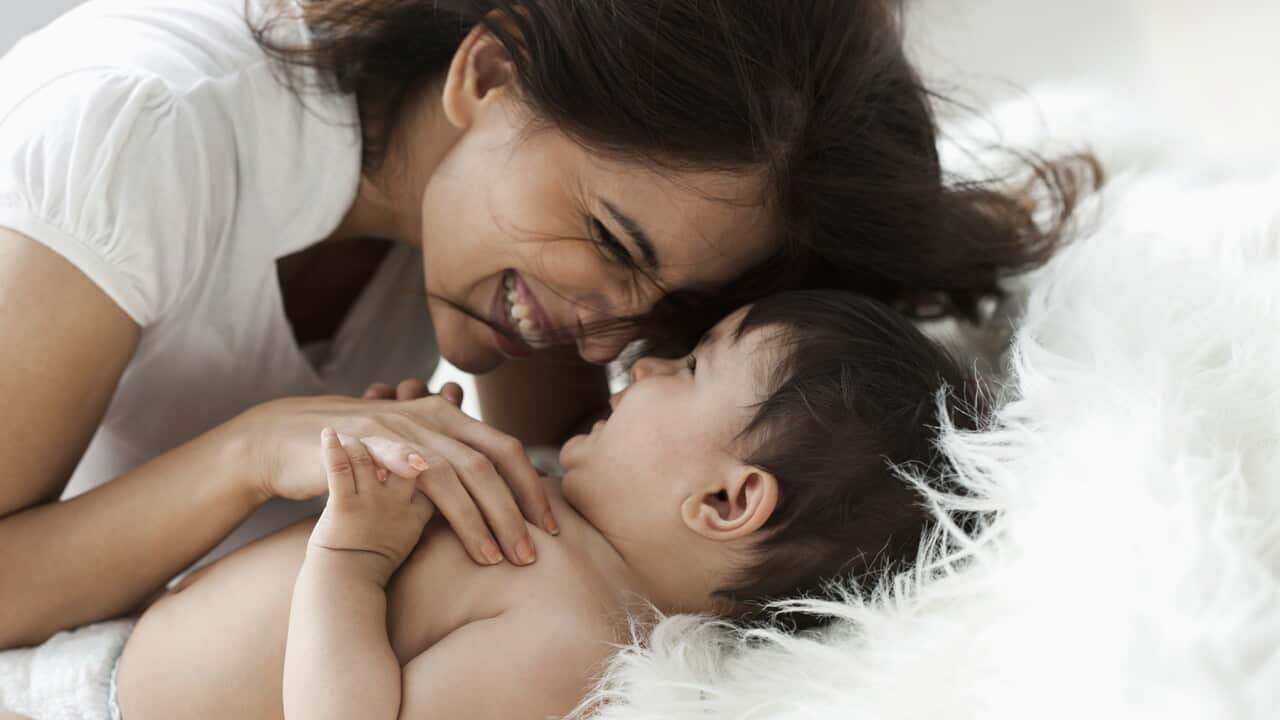

'We want what's best for our children': Reflections on motherhood from Australia’s Nepali community
Women from Australia's Nepali community share their journeys through motherhood, ahead of International Mother's Day.
Published 10 May 2024 11:32am
Updated 10 May 2024 9:26pm
By Dinita Rishal, Sunita Pokharel
Source: SBS
Image: A representative image of a mother playing with her child. (iStockphoto / ChristinLola/Getty Images/iStockphoto)
Key Points
- Sabina Kunwar lost her mother when she was 12. Now she sees her mother's reflection in her daughter.
- A Sydney psychologist says a consistent caregiver is vital to a child's upbringing.
- Women from Australia's Nepali community share their journeys from daughterhood to motherhood.
A decade ago, Sabina Kunwar was a well-known figure in Nepali media,
As the host of a popular television show called Aama (meaning 'mother'), she interviewed renowned personalities alongside their mothers.
Kunwar said the program was a means to express her profound feelings for her mother, who she lost at the age of 12.
"I believe the success of the program stemmed from the genuine sentiments I expressed in each episode,” she told SBS Nepali.
When she was young she said she received extra attention from others, which somewhat alleviated the sense of loss. However, as she matured, she began to yearn for the warmth of that maternal relationship.
"When I attended shoots and witnessed the affection between mothers and their children, hearing them being addressed as nani (baby) or chhori (daughter) only intensified my longing for her,” she said.

Sabina Kunwar as a TV presenter in Nepal. Credit: Facebook/Sabina Kunwar
Having hosted the show for almost half a decade, Kunwar eventually relocated to Australia. Now, as a proud mother of two living in Brisbane, she said she finds solace in seeing her mother's reflection in her three-year-old daughter.
"Whenever I miss my mummy or need to gather myself, I look at my daughter,” she said.
“I have given her the middle name after mummy's name – Laxmi.”
The absence of a mother leaves a significant void. Can it ever be filled?
Pratibha Maharjan, a Sydney-based psychologist, said longing for lost loved ones is a natural human inclination.
She asserted that due to the unique characteristics of each individual, defining the role of a mother and its significance varies from person to person.
"There is no doubt that a mother's role in any child's life is significant,” she told SBS Nepali.
"However, different attachment theories suggest that at least one caregiver should be consistently present in a child's life until they reach six months to one year of age. This primary caregiver can be a mother, father, or even grandparents."

Pratibha Maharjan is a psychologist based in Sydney. Credit: Supplied/Pratibha Maharjan
Nevertheless, studies indicate that children tend to be more responsive to a nurturing caregiving style, often associated with mothers.
"Lacking that secure attachment from a primary or secondary caregiver, the experience can be traumatic and may have enduring effects on personal relationship dynamics and overall personality development," she said.
Does the loss have a greater impact on children compared to adults?
Maharjan suggested that while the trauma of losing a loved one can be equally intense for adults and children, adults are generally better equipped to cope with it.
"More than age, it is about how our brains process grief. It may be more challenging for a child to comprehend and process such a loss, whereas an adult might have a better understanding and process the grief more effectively,” she said.
She said that discussing grief and being open about it can aid in overcoming its effects.

Sabina Kunwar (C) with her children in Australia. Credit: Facebook/Sabina Kunwar
This involved remembering her own mother and cherishing memories of their early days together.
Nowadays, she said celebrating Nepali Mother's Day (observed on 8 May this year according to the Nepali calendar) with her own children has taken on added significance.
"We are living far away from Nepal, and I think it's crucial to pass on our culture and traditions to the next generation as much as we can," Kunwar said.
Reminiscing about cultural roots
When it comes to imparting cultural knowledge to children in a globalised society, Melbourne mother Ranju Regmi can speak for both worlds.
Raising her 16-year-old son in Australia, she said her primary focus is on teaching him about Nepali culture and traditions.

Ranju Regmi (L) with her son. Credit: Supplied/Ranju Regmi
“Sometimes if we miss putting on tika (mixture of red or other coloured vermillion powder and raw rice grains, used to show respect and devotion) one day, my children will complain about it to me on the next day.”
However, she argued many children are more consumed by technology and the internet these days and need to be pushed to enjoy the outdoors.
Ambika Pandey's earliest memory of motherhood dates back to when she was 16 years old, before such technology.
The 52-year-old mother of four and grandmother of two recalled birthing her first child in a cowshed, in a village in far-western Nepal.

Ambika Pandey (second from left) with her children. Credit: Supplied/Saubhagya Pandey
“Things have changed a lot now, there is a lot of support available for new mothers, and I am glad about it.”
She said she is happy that her youngest child is living in a developed place like Australia, despite the distance.
Exploring life through the lens of motherhood
Leela Thapa, 50, said being a mother made her realise the importance of her own mother, and the true essence of motherhood.
“One thing I wish to learn from my late mother is her utmost patience. I stayed with my mother for around six months after having my first child at the age of 18,” she said.
“I get short-tempered sometimes with my children, but my mother was very peaceful. I wish I could get some of my mother’s qualities.”

Leela Thapa (L) during her Melbourne tour to visit her daughter. Credit: Facebook/Lalisha Thapa
“Let’s not celebrate Mother’s Day just for the sake of the date, it should be every day," she said.
"More than any gifts, what mothers want is the best for our children."
Share


